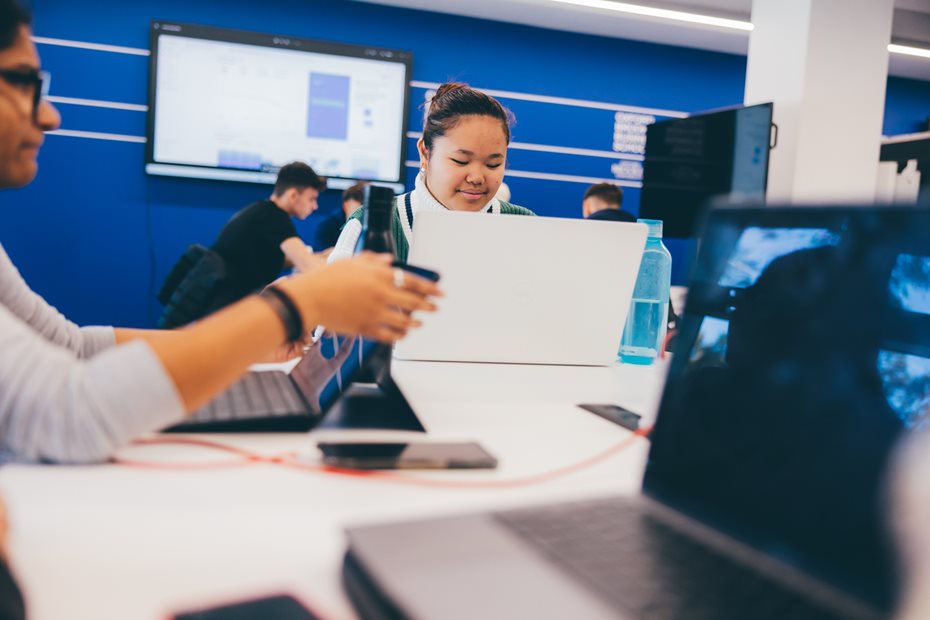UCAS code: N511
Start dates: January 2024 / September 2024 / January 2025 / September 2025
Full time: 3 Years, or 4 if a work placement is chosen
Part time: Up to 8 years
Location: Headington
Department(s): Oxford Brookes Business School
Overview
The future of marketing is digital. Innovative new channels mean new opportunities for reaching audiences and growing brands. Businesses need people like you to help them create content, collect data and make their marketing more effective.
On our BA Digital Marketing, we’ll introduce you to key marketing areas like communication, consumer behaviour and customer insights. Our optional modules will give you the freedom to explore topics that interest you. You’ll also consider what it means to market products and services in a sustainable way, as well as what it takes to be a good leader.
Put your skills to the test. You’ll work on live briefs set by our partners. You might carry out a social media review for a small business, create content for a product launch or look at data to see how to drive more people to checkout.
You’ll spend time sharpening your skills in our Social Media Lab too. Here you’ll find everything a digital marketer needs, from the latest industry-standard tools like Brandwatch to software such as Adobe Creative Cloud.
Ready to switch from consumer to creator?

Why Oxford Brookes University?
-
Marketing and Social Media Lab
Work on real-world marketing projects. Develop the skills that employers are looking for and become confident using industry software.
-
Study abroad opportunities
Do a semester overseas in your second year. Many of our students head to Australia. Where will you go?
-
Professional Placements
Gain ‘real world’ experience at companies like Aldi, Disney, GlaxoSmithKline, Harley-Davidson, BMW, Nissan, Warner Bros, TNT and Xerox.
-
Sustainable mindset
Our courses aim to create the responsible marketing leaders of the future.
-
Diverse optional modules
Enjoy the freedom to explore the areas that interest you, whether that’s creative communication management or customer experience.
-
Study abroad
You may be able to go on a European or international study exchange while you are at Brookes. Most exchanges take place in the second year. Although we will help as much as we can with your plans, ultimately you are responsible for organising and funding this study abroad.
-
Accreditation(s)
Accredited by the Chartered Institute of Marketing and the Institute of Direct and Digital Marketing
Course details
Study modules
In your second year please choose one optional module.
In your final year please also choose one optional module.
Teaching for this course takes place Face to Face and you can expect around nine hours of contact time per week. In addition to this, you should also anticipate a workload of 1,200 hours per year. Teaching usually takes place Monday to Friday, between 9.00am and 6.00pm.
Contact hours involve activities such as lectures, seminars, practicals, assessments, and academic advising sessions. These hours differ by year of study and typically increase significantly during placements or other types of work-based learning.
Please note: As our courses are reviewed regularly as part of our quality assurance framework, the modules you can choose from may vary from those shown here. The structure of the course may also mean some modules are not available to you.
Careers
Digital marketing skills are in high demand, with the top 3 fastest rising jobs all in social media. Social Media Coordinator is increasing by 19%, Community Manager up 18.1% and Social Media Assistant up 16.5% (Marketing Week).
We’ve designed this course to make you feel confident in a range of areas, from critical analysis to teamwork. By the time you graduate, you’ll be ready to apply for these roles in a range of organisations. Or perhaps you want to be part of a digital marketing agency and work for a range of clients.
Our digital marketing students have applied for graduate schemes, as well as roles in:
- marketing analytics
- digital media
- customer relationship management
- social media management
- B2B
- not-for-profit organisations.
Alternatively, you might decide to progress to postgraduate studies to specialise in an area that interests you.
Student profiles
Related courses
Entry requirements
Wherever possible we make our conditional offers using the UCAS Tariff. The combination of A-level grades listed here would be just one way of achieving the UCAS Tariff points for this course.
Standard offer
UCAS Tariff Points: 120
A Level: BBB
IB Points: 31
BTEC: DDM
Further offer details
Applications are also welcomed for consideration from applicants with European qualifications, international qualifications or recognised foundation courses. For advice on eligibility please contact Admissions: admissions@brookes.ac.uk
If you don’t achieve the required tariff points you can apply to join a foundation course, like Foundation in Business or an international foundation course to help to reach the required level for entry onto this degree.
Specific entry requirements
GCSE: Grade 4 (C) in Mathematics
Please also see the University's general entry requirements.
English language requirements
Please see the University's standard English language requirements.
Pathways courses for international and EU students
If you do not meet the entry requirements for this degree, or if you would like more preparation before you start, you can take an international foundation course. Once you enrol, you will have a guaranteed pathway to this degree if you pass your foundation course with the required grades.
If you only need to meet the language requirements, you can take our pre-sessional English course. You will develop key language and study skills for academic success and you will not need to take an external language test to progress to your degree.
English requirements for visas
If you need a student visa to enter the UK you will need to meet the UK Visas and Immigration minimum language requirements as well as the University's requirements. Find out more about English language requirements.
International applications
We welcome applications from students with international qualifications or recognised foundation courses. For advice on eligibility please see our country pages.
If you don’t achieve the required tariff points you can apply to join a foundation course, like Foundation in Business or an international foundation course to help to reach the required level for entry onto this degree.
Credit transfer
Many of our courses consider applications for entry part-way through the course for students who have credit from previous learning or relevant professional experience.
Find out more about transferring to Brookes. If you'd like to talk through your options, please contact our Admissions team.
Terms and Conditions of Enrolment
When you accept our offer, you agree to the Terms and Conditions of Enrolment. You should therefore read those conditions before accepting the offer.
How to apply
Application process
Full time international applicants can also apply through UCAS
Tuition fees
Questions about fees?
Contact Student Finance on:
Tuition fees
Please note, tuition fees for Home students may increase in subsequent years both for new and continuing students in line with an inflationary amount determined by government. Oxford Brookes University intends to maintain its fees for new and returning Home students at the maximum permitted level.
Tuition fees for International students may increase in subsequent years both for new and continuing students.
The following factors will be taken into account by the University when it is setting the annual fees: inflationary measures such as the retail price indices, projected increases in University costs, changes in the level of funding received from Government sources, admissions statistics and access considerations including the availability of student support.
How and when to pay
Tuition fee instalments for the semester are due by the Monday of week 1 of each semester. Students are not liable for full fees for that semester if they leave before week 4. If the leaving date is after week 4, full fees for the semester are payable.
- For information on payment methods please see our Make a Payment page.
- For information about refunds please visit our Refund policy page
Additional costs
Please be aware that some courses will involve some additional costs that are not covered by your fees. Specific additional costs for this course are detailed below.
Optional costs
| Additional costs | Amount (£) |
|---|---|
It’s your responsibility to cover print / binding costs where coursework submission is required. Please note that a lot of the coursework is now submitted online. |
From £30 |
| You may choose to purchase books to support your studies. Many books on our reading lists are available via the Library, or can be purchased secondhand. | £20-60 per book |
Accommodation fees in Brookes Letting (most do not include bills) |
£94-265 per week |
Accommodation fees in university halls (bills included, excluding laundry costs) |
£122-180 per week |
Graduation costs include tickets, gowning and photography. Gowns are not compulsory but typically students do hire robes, starting at £41. |
Typically £0-200 |
Students are responsible for their own travel to and from university for classes. BrookesBus travel is subsidised for full-time undergraduate students that are on a course with a fee of £9,250 or more, or living in an Oxford Brookes hall of residence. There is an administration fee for the production of a BrookesKey. |
From £10 |
Funding your studies
Financial support and scholarships
Featured funding opportunities available for this course.
All financial support and scholarships
Information from Discover Uni
Full-time study
Part-time study
Programme changes:
On rare occasions we may need to make changes to our course programmes after they have been
published on the website. For more information, please visit our
changes to programmes page.



